We write about the other with varying degrees of rigor and success. Homer’s default was narrow (white, male, hetero, warrior), but even that long ago he tasked himself with imagining his way into immortals. Chaucer wrote in the voice of a nun. Shakespeare’s cast included seemingly every rung of the ladder from royal to slave. Still a Martian surveying Western lit could conclude that only white, able-bodied, heterosexual men get anything done around here.
Who Gets to Tell which Stories?
Can a sighted person write a blind character? In this polarized time, the answers come in the weightiest of phrases: Cultural appropriation vs. identity politics. Freedom of speech vs. authenticity and sensitivity. It can be inhibiting if not downright paralyzing. Herewith a few resources to get you moving again:
Novelist Kathryn Tanquary, who is white and lives and teaches in Japan, has 7 Tips for Writing about Other Cultures.
LGBTQI
In Beyond the Closet: Writing about Gay Characters, Dead Darling’s own Kelly J. Ford busts some myths—not every gay person comes out as a teen. Or loves rainbows and sparkles.
Race
Writing race in America is particularly fraught. Slavery, Reconstruction, lynching, Jim Crow, segregation, #BlackLivesMatter, we Americans are steeped in a very particular history. And that’s leaving out wave after wave of anti-immigrant fervor and the near genocide of Native Americans.
Gas on the Fire
Lionel Shriver didn’t help matters when she gave an incendiary keynote at the Brisbane Writers Festival. Her central question was useful: If you haven’t lived it, can you write it? Fiction, she feared, was “in danger of becoming so hedged, so circumscribed, so tippy-toe,” as to be neutralized. But her tone mocked even trivialized real hurt and injustice. Plus her most recent novel of economic collapse included one loaded image—a white husband leading his black wife afflicted with Alzheimer’s on a leash. Shriver further polarized the conversation.
Lots of people responded to Shriver including GrubStreet Writers of Color. They hosted a rich evening of discussion called “Who Gets to Write What?” that centered on “What is cultural appropriation? What is creative freedom? And are those two things necessarily in conflict?” Read the tweet summary, both trenchant and hilarious, here. And a GrubDaily post “Writers of Color Finally at the Center of the Conversation” here.
Also notably responding to Shriver was Yassmin Abdel-Magied in As Lionel Shriver Made Light of Identity, I Had No Choice but to Walk Out On Her. So too did festival volunteer Yen-Rong in her blog Inexorablist. Both noted if you aren’t the marginalized other, and you write a marginalized other and then are feted by the majority culture for doing so—even if the portrayal was poorly done–well then that is, at the very least, galling, and at worst a repeat of colonialism, of racism, of profiting from other-ism. Or as Yen-Rong wrote, “In other words, the subaltern continue to be silenced, and still cannot speak.”
White Privilege
In an ancient (1989) but still relevant article, White Privilege: Unpacking the Invisible Knapsack, white Peggy McIntosh writes that “White privilege is like an invisible weightless knapsack of special provisions, maps, passports, codebooks, visas, clothes, tools and blank checks. Whites can go places others can’t.” (Honestly, if you’re part of any dominant culture, it’s worth examining the contents of your privilege backpack(s). For myself, I count at least four: able, white, American, straight.)
In 2016, deeply talented African-American poet, Claudia Rankine, author of the award-winning Citizen, is using her $625,000 MacArthur genius grant to found the Racial Imaginary Institute, dedicated to studying whiteness.
Who Can Speak for the Deaf Community?
In Lit Hub, deaf writer Sara Nović writes in Who Can Speak for the Deaf Community? that she was excited to get the digital version of a talk on translating literature into sign language. She was nonplussed to discover it was only available in audio. Say what?
“Deaf culture,” writes Nović, “is routinely co-opted by hearing people who want to capitalize on the beauty and intrigue of sign language without having to deal with those pesky people who cannot hear.”
Who Speaks for the Translators?
The translator, @kyra_p, posted a reply. Translators, she wrote, are a “‘third culture’: the culture of the translator/interpreter…. This third culture is my culture. It was also the culture of all members of the audience and, indeed, the culture that was being celebrated at the event to mark International Translation Day.”
If You’re Rolling Your Eyes about Now
I’ll wager some readers are thinking “Translator culture, are you kidding me?” But I think it’s brilliant, a gold mine. We’re all constantly code-switching as we enter and exit various sub-cultures. Any fiction writer worth his or her salt should be delighted with the infinite variety of culture and perspective. Besides it’s a great excuse to travel out of your culture.
Plus We’re Going to Make Mistakes. Or A Yankee Goes to Virginia
A few years back, my aunt and uncle hosted Thanksgiving at their remote Virginia farm. Although he had lived and worked in Botswana, Peru, Azerbaijan, my uncle had settled here, an hour-and-a-half drive from the nearest airport. An hour if my uncle takes the wheel. There was a store, but it closed decades ago.
In the dining room, my uncle pulled me aside. “Don’t tell anyone about the dog.” He pointed to a hound wagging its tail, inches from my grandmother’s china.
A woman, a northerner like me, pet the dog’s head. On the drive down she had seen a skinny dog by the side of the road, a stray. She pulled over. She put the dog in her van. And, by her lights, saved it.
“That’s a hunting dog,” said my uncle, “worth thousands.”
“Really?” I said, unable to see the value.
“My neighbors hear this and they’ll take action.” It wasn’t clear what kind of action, but the implication was violent action. “You should never go to a new place and act. You have to listen for at least three days,” he said.
You don’t know my uncle, and it’s possible he was exaggerating or wrong. But I think his advice sound. In a world new to you, spend some time, long enough that you can tell a stray from a hunting dog, a rescue from a kidnapping.




4 comments